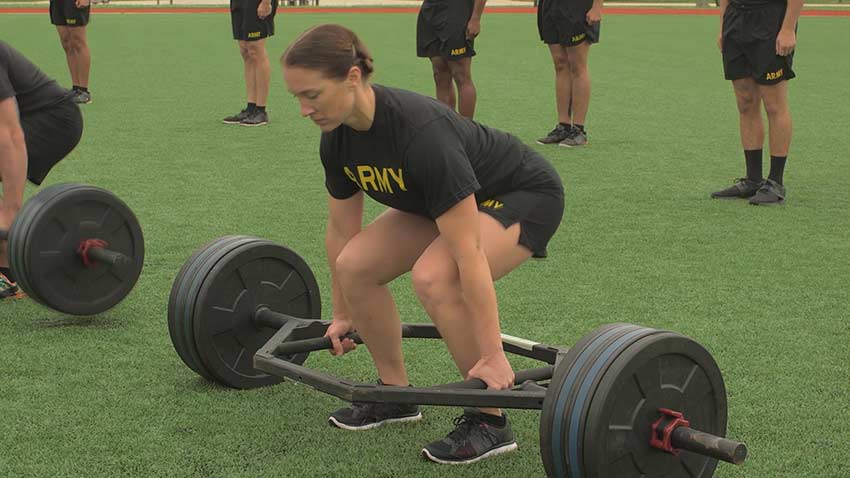In the Army, physical readiness isn’t optional—it’s expected. And for your Future Soldier, one of the first major milestones they’ll face is the Physical Training (PT) Test. This isn’t just about exercise—it’s a statement of preparation, discipline, and resilience.
Understanding what the PT test means, both physically and mentally, can help you better support and encourage your Future Soldier in the weeks leading up to Basic Combat Training (BCT).
What Is the Army Fitness Test?
The Army uses the Army Fitness Test (AFT) to assess each Soldier’s readiness. The Army Fitness Test consists of 5 events that your Future Soldier will be tested on at Basic Training. Passing the AFT is mandatory for graduation from BCT. While training expectations continue to evolve, all Future Soldiers can expect to be tested on:
- Hand Release Push Up
- 3 Rep Maximum Deadlift
- Plank
- Sprint-Drag-Carry
- 2 Mile Run
These events test more than just physical ability—they evaluate determination, effort, and consistency under pressure. Soldiers are expected to meet minimum standards, but the goal is always progress, not perfection.
Why It Matters in Basic Training
The PT test serves as both a benchmark and a motivator. Here’s why it’s important:
- Pass/Fail Requirements: your Future Soldier will be required to pass it prior to graduation
- Injury Prevention: Trainees who are physically prepared are less likely to get injured.
- Morale and Momentum: Early wins build confidence. Struggles with fitness can be discouraging—especially if they feel preventable.
Supporters who understand the significance of the PT test can offer motivation without pressure—reminding their Soldier that preparation is within their control.
How to Support Their Preparation
Even if you’re not running alongside them, you can still be part of the training process:
- Ask them how their training is going—not just if they did it, but how it felt.
- Encourage consistency over intensity. Daily effort matters more than pushing too hard once a week.
- Offer to go on walks or join them for light bodyweight workouts as a show of support.
- Celebrate progress—whether that’s more push-ups, longer planks, or shaving seconds off a run time.
Support should feel like partnership, not pressure.
What to Say If They’re Struggling
Not everyone starts from the same place. Some Future Soldiers will feel ready from Day One. Others may feel behind or overwhelmed.
If your recruit is struggling, remind them:
- “Improvement is what matters most.”
- “The Army will train you, but showing up prepared shows respect for yourself and your team.”
- “One bad run doesn’t define you. Keep showing up.”
Basic Training is designed to build them—but it’s easier to build on a foundation they’ve already started laying.
Mental Toughness Is Part of the Test, Too
The PT test isn’t just a measure of physical skill—it’s a moment of mental pressure. Recruits are timed, watched, and evaluated. That means nerves, adrenaline, and doubt all come into play.
Help them prepare mentally by:
- Encouraging visualization and goal setting
- Practicing calm, controlled breathing during workouts
- Reinforcing the idea that growth under pressure is part of the journey
These mindset tools are just as important as reps and miles.
Last Call
The Army Fitness Test test is one of the first major hurdles in your Future Soldier’s Army journey—but it’s also one of the most empowering. It shows them what they’re capable of, reminds them how far they’ve come, and sets the tone for the discipline ahead. Your encouragement, perspective, and belief in their strength can turn a challenge into a turning point. Keep cheering. Keep listening. Keep believing. They’ve got this—and you’ve got their back.
